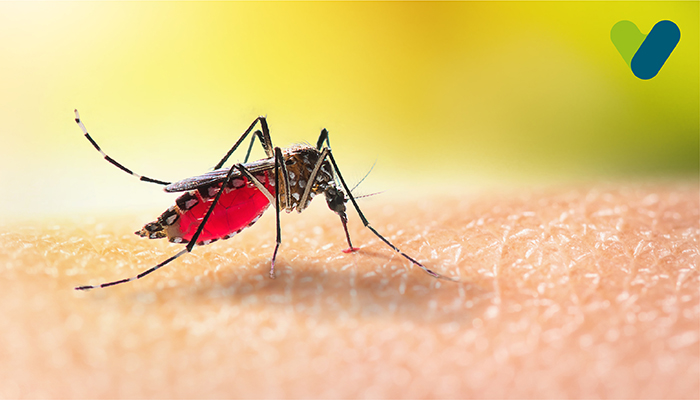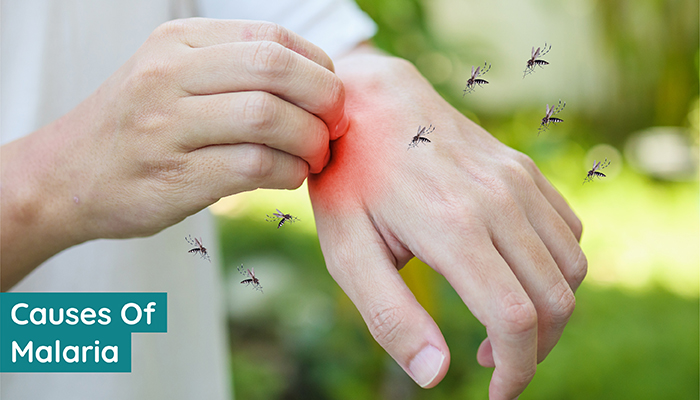Malaria is a parasitic disease transmitted by the bite of an infected female Anopheles mosquito. When the parasite Plasmodium enters your body, they travel to the liver, where they mature after a few days. The parasites enter the bloodstream on maturity and infect the red blood cells. After the Plasmodia multiply inside the red blood cells, they trigger fever and multi-organ disease, which can be life-threatening
Insights
Malaria is a blood-transmitted disease that is not contagious- It cannot spread through casual contact or coitus. Mosquitoes transmit malaria to humans. It is prevalent in tropical and subtropical countries with warmer temperatures, which allows the Anopheles mosquitoes to thrive. The parasites need higher temperatures to develop inside the mosquito.The mosquito is considered the deadliest creature in the world. According to WHO, mosquito bites result in the deaths of over 1 million people every year.
Common Types of Mosquitoes
Anopheles: The female Anopheles is among the only types of malaria-spreading mosquitoes that bite between dusk and dawn. The mosquitoes feed on human blood to nourish their eggs. While taking its meal, the infected mosquito injects immature forms of the Plasmodium parasites, called sporozoites, into the person’s bloodstream. The blood carries the sporozoites to the liver, where they mature into schizonts. Over the next two weeks, the schizont multiplies into thousands of merozoites, which break out of the liver and invade red blood cells, grow and divide further, and destroy the blood cells. From about 460 species around the world, six leading Anopheles species transmit malaria in regions across India.Aedes: Prevalent in the tropical and subtropical zones, including across India, the Aedes can be identified by the black and white markings on their body and legs. Unlike other mosquitoes, they are active early in the morning and evening before dusk. They transmit viruses that cause Zika, Dengue, Yellow, West Nile, Chikungunya, and Eastern equine encephalitis, amongst many others.
Culex: Culex is a family of mosquitoes, of which several species spread other types of malaria, including arbovirus infections, filariasis, West Nile virus, Japanese encephalitis, St. Louis encephalitis, and avian malaria. They are everywhere except for the northern part of the temperate zone.
Types Of Malaria Parasites
Five types of malaria parasites or Plasmodia are known to cause malaria in humans according to WHO, namely, P. falciparum, P. vivax, P. ovale, P. malaria, and P. knowlesi. Of these, only two species, P. falciparum, and P. vivax are predominantly found across India and account for most malaria cases.In India, the following types of malaria parasites infect humans:
- Plasmodium vivax (Pv): It is a protozoal parasite and a human pathogen, predominantly found in India and spread globally. Pv causes nearly 60 percent of malaria cases in India. Although the illness is prominent, it seldom causes any severe issues.
- Plasmodium falciparum (Pf): The 1 is severe, causing the most significant number of malaria-related deaths. It is found in South America, Africa, and Southeast Asia and is predominant in India.
Malaria Symptoms
After a mosquito bites a person, the symptoms can appear within ten days to a month. Symptoms vary depending on the type of parasite. Some people don’t experience symptoms for up to a year after the mosquito bite. It can cause severe health problems such as paralysis, seizures, brain damage, trouble breathing, organ failure, and death if not treated on time.Some types of malaria and their symptoms can reoccur when the parasites remain inactive in your liver for years before being released into your bloodstream. The symptoms begin again when the parasites start circulating.
Malaria Symptoms may include:
- Fever & Chills
- General feeling of discomfort & Headache
- Nausea and vomiting
- Diarrhoea
- Abdominal pain
- Muscle or joint pain
- Fatigue
- Rapid breathing & heart rate
- Cough
Malaria Diagnosis
The doctor will examine you and inquire about your symptoms and travel history. They will take your blood sample for a malaria lab test to see if you have malaria parasites. A blood smear examination is the standard test for identifying malarial parasites.A blood drop is collected and smeared onto a glass slide during this test. The smear is stained with a Romanovsky or Giemsa stain and examined under the microscope to determine if you have malaria and identify the type of parasite causing your symptoms. The doctor will analyze the malaria lab test to determine the proper treatment.
Malaria Treatment
The first step is to start treating malaria as soon as possible. Your doctor will prescribe medications to kill malaria, although some parasites are resistant to malaria drugs. Some of the commonly prescribed antimalarial drugs include Chloroquine. Doxycycline, Mefloquine. Quinine, among others.Protection from mosquitoes
You can take precautions to avoid mosquito bites, but you are still at risk for malaria, even with protection.To lower your chances of getting malaria, you can:
- Apply insect-repellent creams to exposed skin.
- Rub citronella oil on the wrist and clothing
- Wear long-sleeved clothing & full pants if you are outdoors at night.
- Use a mosquito net if the bedroom is not air-conditioned or screened.
- Put on electric anti-mosquito repellents or coils.


